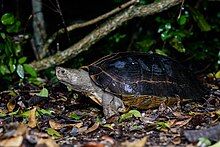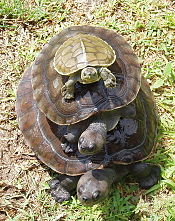Giant Asian pond turtle
| Giant Asian pond turtle | |
|---|---|

| |
| Kaeng Krachan District, Phetchaburi, Thailand | |
| Scientific classification | |
| Domain: | Eukaryota |
| Kingdom: | Animalia |
| Phylum: | Chordata |
| Class: | Reptilia |
| Order: | Testudines |
| Suborder: | Cryptodira |
| Superfamily: | Testudinoidea |
| Family: | Geoemydidae |
| Genus: | Heosemys |
| Species: | H. grandis
|
| Binomial name | |
| Heosemys grandis (Gray, 1860)[3]
| |
| Synonyms[4] | |
| |
The giant Asian pond turtle (Heosemys grandis) inhabits rivers, streams, marshes, and rice paddies from estuarine lowlands to moderate altitudes (up to about 400 metres (1,300 ft)) throughout Cambodia and Vietnam and in parts of Laos, Malaysia, Myanmar and Thailand.[1][5]
Description
[edit]Slight variations in coloration can be seen among the species. The carapace of the giant Asian pond turtle has a brown to black coloration with a distinct ridge along the center while the plastron is yellow in color. The head is gray to brown in color.[6]
Habitat and behavior
[edit]Capable of living in water or on land the giant Asian pond turtle can be located along bodies of water such as lakes, ponds, rivers, streams, and canals. The giant Asian pond turtle is omnivorous and finds food in both aquatic and terrestrial environments. Their diets consist of worms, larvae, insects, snails, deceased animals, and aquatic and terrestrial plants.[7] Similarly to other species of turtles, the giant Asian pond turtle has developed adaptations and different techniques for capturing prey in both types of environments.[8]
Major threats
[edit]The main area of concern is the illegal capture and export of these turtles for use as food and (less commonly) as pets in parts of Asia. Additionally, their habitat is threatened by land conversion for agriculture.[1][9]
Gallery
[edit]-
Adult, carapace view, in Kaeng Krachan District, Phetchaburi
-
Adult, plastron view, in Kaeng Krachan District
-
Juvenile in Tha Yang District, Phetchaburi
-
Juvenile, carapace view, in Tha Yang District
-
Juvenile, plastron view, in Tha Yang District
References
[edit]- ^ a b c Cota, M.; Horne, B.D.; Shepherd, C. (2021). "Heosemys grandis". IUCN Red List of Threatened Species. 2021: e.T9943A3152603. doi:10.2305/IUCN.UK.2021-2.RLTS.T9943A3152603.en. Retrieved 19 November 2021.
- ^ "Appendices | CITES". cites.org. Retrieved 2022-01-14.
- ^ Artner, H. (2008). "The World's Extant Turtle Species" (PDF). Emys. 15 (3). Archived from the original on September 12, 2011. Retrieved March 27, 2011.
{{cite journal}}: CS1 maint: unfit URL (link) - ^ Fritz Uwe; Peter Havaš (2007). "Checklist of Chelonians of the World". Vertebrate Zoology. 57 (2): 224. doi:10.3897/vz.57.e30895. ISSN 1864-5755.
- ^ Rhodin, Anders G.J.; Inverson, John B.; Roger, Bour; Fritz, Uwe; Georges, Arthur; Shaffer, H. Bradley; van Dijk, Peter Paul; et al. (Turtle Taxonomy Working Group) (August 3, 2017). Rhodin A G.J.; Iverson J.B.; van Dijk P.P.; Saumure R.A.; Buhlmann K.A.; Pritchard P.C.H.; Mittermeier R.A. (eds.). "Turtles of the world, 2017 update: Annotated checklist and atlas of taxonomy, synonymy, distribution, and conservation status(8th Ed.)" (PDF). Chelonian Research Monographs. Conservation Biology of Freshwater Turtles and Tortoises: A Compilation Project of the IUCN/SSC Tortoise and Freshwater Turtle Specialist Group. 7 (8 ed.): 1–292. doi:10.3854/crm.7.checklist.atlas.v8.2017. ISBN 978-1-5323-5026-9. Retrieved October 4, 2019.
- ^ Giant Asian pond turtle photos and facts. (n.d.). http://www.arkive.org/giant-asian-pond-turtle/heosemys-grandis/ Archived 2018-03-21 at the Wayback Machine
- ^ Lintner M, Weissenbacher A, Heiss E (2012) The Oropharyngeal Morphology in the Semiaquatic Giant Asian Pond Turtle, Heosemys grandis, and Its Evolutionary Implications. PLOS ONE 7(9): e46344. https://doi.org/10.1371/journal.pone.0046344
- ^ Summers, A. P., Darouian, K. F., Richmond, A. M., & Brainerd, E. L. (1998). Kinematics of aquatic and terrestrial prey capture in Terrapene carolina, with implications for the evolution of feeding in cryptodire turtles. The Journal of Experimental Zoology, 281(4), 280-287. doi:10.1002/(sici)1097-010x(19980701)281:43.0.co;2-k
- ^ Van Dijk, P. P., Stuart, B. L., & Rhodin, A. G. (Eds.). (2000). Asian Turtle Trade: Proceedings of a Workshop on Conservation and Trade of Freshwater Turtles and Tortoises in Asia. Chelonian Research Monographs, 2.








